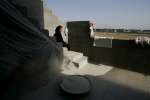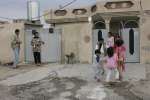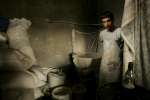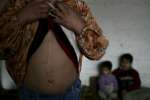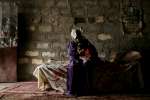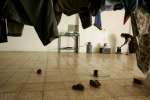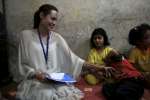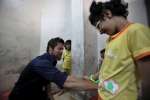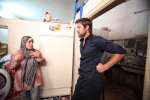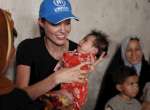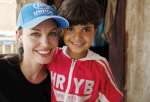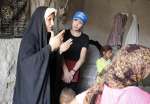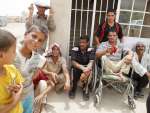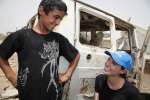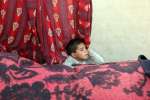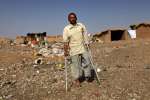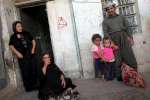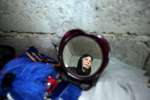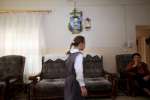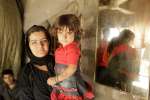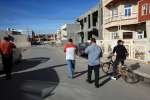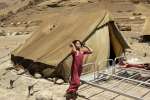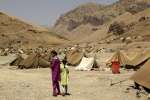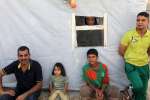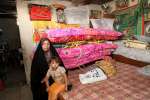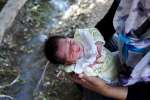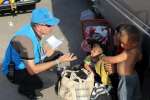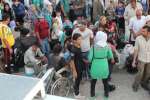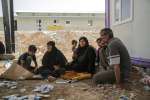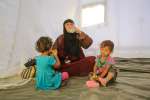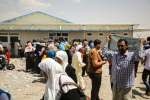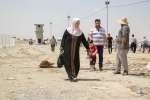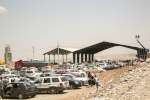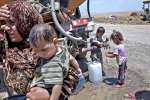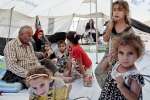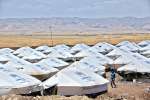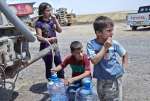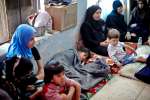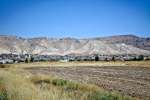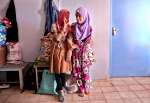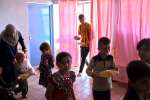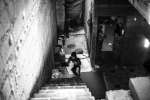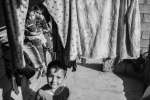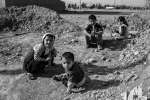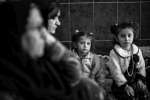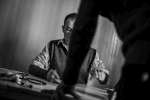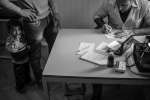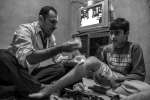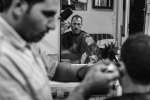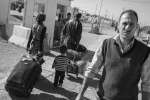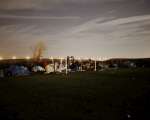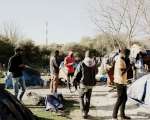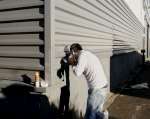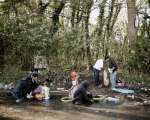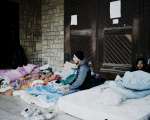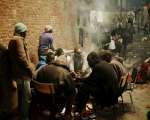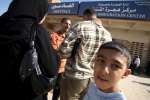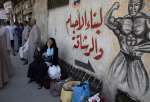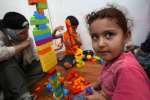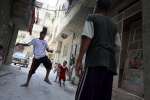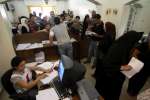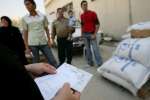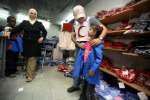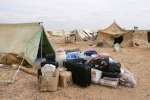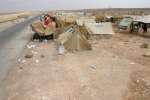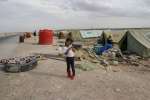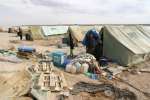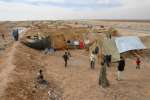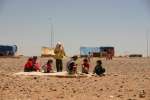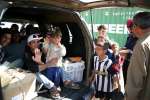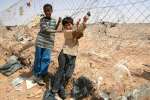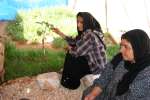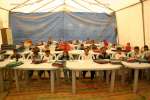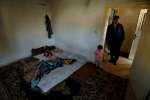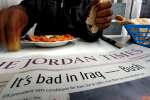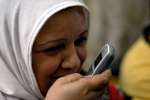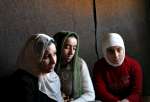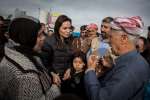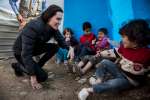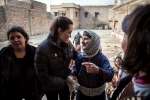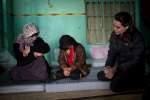
Iraq 
2015 UNHCR country operations profile - Iraq
| Overview |
Working environment
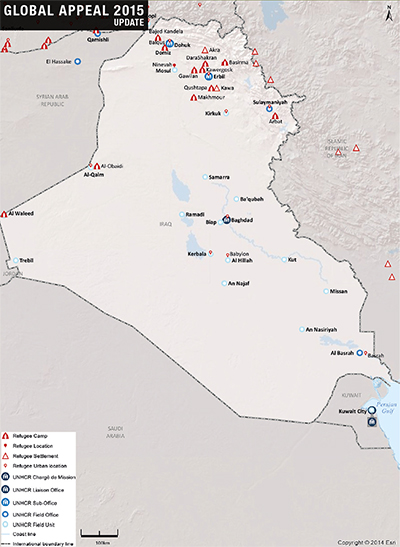
-
The escalation of armed conflict across the central governorates of Iraq, and the constantly changing security situation, have resulted in new and secondary movements of internally displaced people (IDPs) across central Iraq and the Kurdistan Region of Iraq (KR-I).
-
UNHCR's access to some IDP and refugee locations (particularly in central Iraq), as well as the ability of IDPs and refugees to transit through certain areas of Iraq, will likely remain restricted.
-
Newly displaced people in Iraq find their limited financial resources quickly depleted by the increasing costs of accommodation and basic foods.
-
The number of Iraqis seeking refuge in other countries is rising considerably; however, it is anticipated that the Syrian refugee population currently in Iraq will probably remain at a similar level or increase slightly, depending on developments in the north-eastern part of the Syrian Arab Republic (Syria).
-
The central Government and KR-I authorities have contributed to the IDP and Syrian refugee response with: registration, core relief item (CRI) distribution, cash assistance, essential services in collective centres, and land allocation and site preparation for camps.
People of concern
The main groups of people of concern planned for in 2015 are: refugees and asylum-seekers of mostly Syrian, Palestinian, Iranian and Turkish origin, located in camps, settlements and urban areas across the country, essentially in the KR-I but also in Baghdad and other central governorates; over 1 million IDPs already displaced in the country before the new upsurge in violence in 2014, and many others forcibly displaced - some forced to move multiple times - within the country since mid-2014; returnees (mainly to Baghdad governorate), most of whom are coming back from Syria; tens of thousands of people, mainly Faili Kurds and Bidoon, thought to be stateless in Iraq, whose situation is difficult to assess given current access limitations. In addition, since February 2012, UNHCR has been working to identify individuals with international protection needs and to find solutions outside Iraq for the remaining population (2,746 individuals) of the Hurriya Temporary Transit Location (formerly Ashraf Camp) residents.
| Type of population |
Origin |
January 2015 |
December 2015 |
| Total in country |
Of whom assisted
by UNHCR |
Total in country |
Of whom assisted
by UNHCR |
| Total |
2,047,700 |
512,700 |
2,019,050 |
578,050 |
| Refugees |
Palestinian |
12,000 |
12,000 |
12,400 |
12,400 |
| Syrian Arab Rep. |
310,000 |
310,000 |
400,000 |
400,000 |
| Turkey |
16,000 |
16,000 |
16,600 |
16,600 |
| Various |
8,300 |
8,300 |
8,550 |
8,550 |
| People in refugee-like situations |
Various |
2,000 |
2,000 |
1,500 |
1,500 |
| Asylum-seekers |
Islamic Rep. of Iran |
6,000 |
6,000 |
5,500 |
5,500 |
| Syrian Arab Rep. |
1,200 |
1,200 |
1,200 |
1,200 |
| Turkey |
1,400 |
1,400 |
1,500 |
1,500 |
| Various |
800 |
800 |
800 |
800 |
| Returnee arrivals during year (ex-refugees) |
Iraq |
40,000 |
20,000 |
35,000 |
15,000 |
| Internally displaced |
Iraq |
1,500,000 |
120,000 |
1,400,000 |
100,000 |
| Returnee arrivals during year (ex-IDPs) |
Iraq |
100,000 |
10,000 |
90,000 |
10,000 |
| Stateless |
Stateless |
50,000 |
5,000 |
46,000 |
5,000 |
| Response |
Needs and strategies
Since the 2015 plan and corresponding comprehensive budget for the Iraq operation were drawn up (mid-2014), the situation in the country has changed significantly. In 2015, the total population of concern to UNHCR is likely to exceed 3 million people. While UNHCR will remain engaged with all populations of concern, the programme will mainly be oriented towards the protection of refugees. The Office will continue to take the lead in coordinating the humanitarian response for all refugee populations.
The Office will also continue its engagement in the IDP situation within the framework of the inter-agency cluster approach, leading three designated clusters, namely protection, camp coordination and camp management (CCCM), and shelter/non-food items (NFIs). It will advocate the Government of Iraq, UN Country Team and other actors fulfil their respective responsibilities with regard to IDPs, particularly for those displaced before the recent crises in 2014.
UNHCR's strategy in Iraq will continue to focus on working together with the Government, other humanitarian stakeholders and donors to provide protection and durable solutions for people of concern. The main areas for attention will be to advocate and promote legal and protection interventions, deliver basic assistance and support to newly displaced people and longstanding IDP populations, as well as to build the capacity of governmental and national non-governmental partners.
| Implementation |
Coordination
UNHCR leads the refugee protection and assistance response in support of the Iraqi authorities.
The Integrated Coordination Office for Development and Humanitarian Assistance (ICODHA) coordinated the inter-agency response to the IDP crisis in Iraq until mid-2014. Since then the OCHA-led inter-agency coordination mechanism has been working in close cooperation with the Government of Iraq and the Kurdistan Regional Government, represented by the Iraqi Ministry of Migration and Displacement and the Department for Displacement and Migration, respectively. UNHCR leads the Protection, CCCM and Shelter/NFI clusters throughout Iraq.
In response to the Syrian refugee crisis, a comprehensive system of coordination with all Regional Response Plan partners was formalized in 2013, including nine sectors, most of which are co-chaired by international NGOs. In the KR-I, this sector system for the Syrian refugee response formed the basis for the response to the needs of new IDPs. Maintaining this approach will avoid duplication efforts and ensure efficient coordination.
| Implementing partners |
| Government agencies: Development and Modification Centre - Domiz camp, Directorate of Displacement and Migration, Erbil Refugee Council, Ministry of Displacement and Migration |
| NGOs: Action contre la Faim, Agency for Technical Cooperation and Development (ACTED), Al Arqam Cultural Charity Association, Al Khair Humanitarian Organization, Association for Cultural Development for Civil Society, Civil Development Organization, Croix-Rouge française, Danish Refugee Council, Harikar, International Rescue Committee, INTERSOS, Iraqi Humanitarian League for Human Rights, Iraqi Youth League, Islamic Relief Worldwide, Kurdistan Reconstruction and Development Society, NGO Coordination Committee for Iraq, Norwegian Refugee Council, Peace Winds Japan, Première Urgence - Aide Médicale Internationale, Qandil, Reach, Rebuild Iraq Recruitment Program, Resurrecting Iraq People Centre, Save the Children Federation, Un Ponte Per |
| Others: IOM, UNESCO, UN-Habitat |
| Operational partners |
| Government agencies: Directorate of Displacement and Migration, Ministry of Displacement and Migration, Permanent Committee of Refugees/Ministry of the Interior |
| NGOs: ACTED, Croix-Rouge française, Danish Refugee Council, International Rescue Committee, Islamic Relief Worldwide, Norwegian Refugee Council, Peace Winds Japan, Première Urgence - Aide Médicale Internationale, Save the Children Federation |
| Others: IOM, UNESCO, UNICEF, WFP, WHO |
| Financial information |
The Iraq operation's revised 2013 budget amounted to USD 293.7 million, in light of the growing needs of Syrian refugees. In 2014, the ExCom-approved budget was set at USD 216 million, a drop from 2013 that reflected less shelter construction for IDPs and refugee returnees.
However, the onset of armed conflict in Anbar in early 2014 and the further escalation in violence across central Iraq since the middle of the year, also affecting the KR-I, saw UNHCR launch a supplementary appeal, increasing the total requirements for 2014 for Iraq to well over half a billion USD.
UNHCR Iraq's approved 2015 comprehensive budget stands at USD 230.5 million. However, this amount is likely to be revised upwards to cover the evolving needs of the people displaced within the country by the ongoing conflict. Any additional requirements for 2015 not covered in the comprehensive budget will be presented subsequently in a supplementary appeal.
Source: UNHCR Global Appeal 2015 Update
|
| Residing in Iraq [1] |
|---|
| Refugees [2] | 288,035 |
|---|
| Asylum Seekers [3] | 7,420 |
|---|
| Returned Refugees [4] | 3,318 |
|---|
| Internally Displaced Persons (IDPs) [5] | 3,962,142 |
|---|
| Returned IDPs [6] | 716 |
|---|
| Stateless Persons [7] |  50,000 Pending a more accurate study into statelessness in Iraq, the estimate of stateless persons in Iraq has been adjusted to reflect the reduction of statelessness in line with Law 26 of 2006, which allows stateless persons to apply for nationality in certain circumstances. |
|---|
| Various [8] | 29 |
|---|
| Total Population of Concern | 4,311,660 |
|---|
| Originating from Iraq [1] |
|---|
| Refugees [2] |  377,747 Refugee figure for Iraqis in the Syrian Arab Republic is a Government estimate. UNHCR has registered and is assisting 23,500 Iraqis at mid-2015. The refugee population in Jordan includes 32,800 Iraqis registered with UNHCR. The Government of Jordan estimated the number of Iraqis at 400,000 individuals at the end of March 2015. This included refugees and other categories of Iraqis. |
|---|
| Asylum Seekers [3] | 141,913 |
|---|
| Returned Refugees [4] | 3,318 |
|---|
| Internally Displaced Persons (IDPs) [5] | 3,962,142 |
|---|
| Returned IDPs [6] | 716 |
|---|
| Various [8] | 45 |
|---|
| Total Population of Concern | 4,485,881 |
|---|
|
| 2013 Contributions Breakdown |
|---|
Total contribution in USD: 9,965,812 [rank: 21]
Total contribution in currency: 11,660,000,000 (IQD)
Donor ranking per GDP: 9
Donor ranking per capita: 24
 |
| Contributions since 2000 |
|---|
| Year | USD |
|---|
| 2014 | 0 |
|---|
| 2013 |  9,965,812 Total contribution in USD: 9,965,812 [rank: 21]
Total contribution in currency: 11,660,000,000 (IQD)
Donor ranking per GDP: 9
Donor ranking per capita: 24 |
|---|
| 2012 | 0 |
|---|
| 2011 | 0 |
|---|
| 2010 | 0 |
|---|
| 2009 | 0 |
|---|
| 2008 |  8,000,000 Total contribution in USD: 8,000,000 (rank: 20)
Total contribution in currency: -
Donor ranking per GDP: 5
Donor ranking per capita: 25 |
|---|
| 2007 | 0 |
|---|
| 2006 | 0 |
|---|
| 2005 | 0 |
|---|
| 2004 | 0 |
|---|
| 2003 | 0 |
|---|
| 2002 | 0 |
|---|
| 2001 | 0 |
|---|
| 2000 | 0 |
|---|
|
| Private sector fund raising 2013 |
|---|
Total contribution in USD: 613,380
Total contribution in currency: 378,332,000 (IQD); 290,019 (USD)
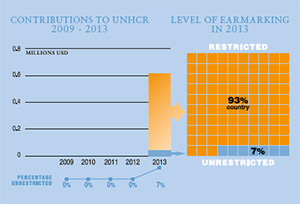 |
| Contributions since 2006 |
|---|
| Year | USD |
|---|
| 2014 | 0 |
|---|
| 2013 |  613,380
Total contribution in USD: 613,380
Total contribution in currency: 378,332,000 (IQD); 290,019 (USD)
|
|---|
| 2012 | 0 |
|---|
| 2011 | 0 |
|---|
| 2010 | 0 |
|---|
| 2009 | 0 |
|---|
| 2008 | 0 |
|---|
| 2007 | 0 |
|---|
| 2006 | 0 |
|---|
Rapid Needs Assessments (RNAs) of recently displaced persons in the Kurdistan region.
more documentsCrisis in Iraq: Displacement
UNHCR and its partners estimate that out of a total population of 26 million, some 1.9 million Iraqis are currently displaced internally and more than 2 million others have fled to nearby countries. While many people were displaced before 2003, increasing numbers of Iraqis are now fleeing escalating sectarian, ethnic and general violence. Since January 2006, UNHCR estimates that more than 800,000 Iraqis have been uprooted and that 40,000 to 50,000 continue to flee their homes every month. UNHCR anticipates there will be approximately 2.3 million internally displaced people within Iraq by the end of 2007. The refugee agency and its partners have provided emergency assistance, shelter and legal aid to displaced Iraqis where security has allowed.
In January 2007, UNHCR launched an initial appeal for US$60 million to fund its Iraq programme. Despite security issues for humanitarian workers inside the country, UNHCR and partners hope to continue helping up to 250,000 of the most vulnerable internally displaced Iraqis and their host communities
Posted on 12 June 2007
Crisis in Iraq: Displacement
UNHCR Goodwill Ambassador Angelina Jolie meets Iraqi refugees in Syria
UNHCR Goodwill Ambassador Angelina Jolie returned to the Syrian capital Damascus on 2 October, 2009 to meet Iraqi refugees two years after her last visit. The award-winning American actress, accompanied by her partner Brad Pitt, took the opportunity to urge the international community not to forget the hundreds of thousands of Iraqi refugees who remain in exile despite a relative improvement in the security situation in their homeland. Jolie said most Iraqi refugees cannot return to Iraq in view of the severe trauma they experienced there, the uncertainty linked to the coming Iraqi elections, the security issues and the lack of basic services. They will need continued support from the international community, she said. The Goodwill Ambassador visited the homes of two vulnerable Iraqi families in the Jaramana district of southern Damascus. She was particularly moved during a meeting with a woman from a religious minority who told Jolie how she was physically abused and her son tortured after being abducted earlier this year in Iraq and held for days. They decided to flee to Syria, which has been a generous host to refugees.
UNHCR Goodwill Ambassador Angelina Jolie meets Iraqi refugees in Syria
Angelina Jolie returns to Iraq, urges support for the displaced
UNHCR Goodwill Ambassador Angelina Jolie returned to Iraq in July 2009 to offer support to the hundreds of thousands of Iraqis who remain displaced within their own country.
During her day-long visit to Baghdad, UNHCR Goodwill Ambassador Angelina Jolie visited a makeshift settlement for internally displaced people in north-west Baghdad where she met families displaced from the district of Abu Ghraib, located to the west of Baghdad, and from the western suburbs of the capital.
Despite the difficulties in Iraq, Jolie said this was a moment of opportunity for Iraqis to rebuild their lives. "This is a moment where things seem to be improving on the ground, but Iraqis need a lot of support and help to rebuild their lives."
UNHCR estimates that 1.6 million Iraqis were internally displaced by a wave of sectarian warfare that erupted in February 2006 after the bombing of a mosque in the ancient city of Samarra. Almost 300,000 people have returned to their homes amid a general improvement in the security situation since mid-2008.
Angelina Jolie returns to Iraq, urges support for the displaced
The internally displaced of Iraq
Eight years after the fall of Saddam Hussein's regime, over 1.5 million people remain displaced throughout Iraq, including 500,000 who live in dire conditions in settlements or public buildings. For these very vulnerable people, daily life is a struggle with limited access to clean water, electricity, heath services or schools for their children. Many families who live illegally in informal settlements are at risk of eviction. Most of the internally displaced fled their homes because of sectarian violence which erupted in 2006 following the bombing of the Al-Askari shrine in Samarra. UNHCR works with the Government of Iraq on projects such as land allocation; shelter assistance and house reconstruction to try to find long term solutions for the displaced.
The internally displaced of Iraq
An Infant's Journey to Safety
Three days after giving birth to her fourth child, a girl she named Hawler, Peroz concluded that the situation in her hometown of Hassake, Syria, was too dangerous for her children. She decided to make the difficult journey to northern Iraq. Along the way, she and Hawler were sick. "I was terrified the baby might die," said Peroz, 27.
Although the border was closed, guards felt compassion for the newborn child and let Peroz's family enter. A few days later Peroz and her children were reunited with their father and now they are living with hundreds of other refugees in a small park on the outskirts of Erbil.
Battling mosquitoes and soaring daytime temperatures, and with little more than blankets for comfort and a breakfast of bread and cheese for nourishment, Peroz and her husband hope to be transferred to a new tented settlement.
Over the past few weeks, tens of thousands of Syrians have flooded into northern Iraq, fleeing violence. With existing camps at full capacity, many refugee families are finding shelter anywhere they can. The local government has started transferring people from Qushtapa Park to a nearby camp. UNHCR is registering the refugees, as well as providing tents and life-saving assistance.
An Infant's Journey to Safety
Syrians stream from their war-torn country into Iraq's Kurdistan region
Thousands of Syrians streamed across a bridge over the Tigris River and into Iraq's Kurdistan region on Thursday, August 15th. UNHCR Field Officer, Galiya Gubaeva, was on the ground with her camera.
Syrians stream from their war-torn country into Iraq's Kurdistan region
Iraq: Massive displacement from Mosul
In the past few days, hundreds of thousands of Iraqi civilians have fled fighting in the northern city of Mosul and other areas. UNHCR staff are on the ground to monitor the outflow and help those in need. The needs are immense, but UNHCR is working to provide shelter, protection, and emergency items, including tents. Many of the displaced left their homes without belongings and some lack money for housing, food, water or medical care. They arrive at checkpoints between Ninewa governorate and the Kurdistan region with no idea of where to go next, or how to pay expenses.
UN agencies, humanitarian groups, and government officials are coordinating efforts to do what they can to aid those in need. UN agencies are making an emergency request for additional support. UNHCR is hoping to provide emergency kits as well as thousands of tents. UNHCR and its partners will also be working to protect and help the displaced.
The exodus in the north comes on top of massive displacement this year in the western Iraqi governorate of Anbar, where fighting since January has forced some half-a-million people to flee the province or seek shelter in safer areas.
Iraq: Massive displacement from Mosul
Iraq Crisis: Finding a Place to Stay
Tens of thousands of people have fled to Erbil and Duhok governorates in Iraq's Kurdistan region over the past week, sheltering in schools, mosques, churches and temporary camps following a surge of violence in parts of central and northern Iraq. UNHCR and its partners have been working to meet the urgent shelter needs. The refugee agency has delivered close to 1,000 tents to a transit camp being built by the authorities and NGOs at Garmawa, near Duhok.
Many of the people arriving from Mosul at checkpoints between Ninewa and governorate and Iraq's Kurdistan region have limited resources and cannot afford to pay for shelter. Some people stay with family, while others are staying in hotels and using up their meagre funds.
In the village of Alqosh, some 150 people from 20 families, with little more than the clothes on their back, have been living in several overcrowded classrooms in a primary school for the past week. One member of the group said they had lived in a rented apartment in Mosul and led a normal family life. But in Alqosh, they feared for the welfare and education of their children and the presence of snakes and scorpions.
Iraq Crisis: Finding a Place to Stay
Erbil's Children: Syrian Refugees in Urban Iraq
Some of the most vulnerable Syrian refugees are children who have sought shelter in urban areas with their families. Unlike those in camps, refugees living in towns and cities in countries like Iraq, Turkey and Jordan often find it difficult to gain access to aid and protection. In a refugee camp, it is easier for humanitarian aid organizations such as UNHCR to provide shelter and regular assistance, including food, health care and education. Finding refugees in urban areas, let alone helping them, is no easy task.
In Iraq, about 100,000 of the 143,000 Syrian refugees are believed to be living in urban areas - some 40 per cent of them are children aged under 18 years. The following photographs, taken in the northern city of Erbil by Brian Sokol, give a glimpse into the lives of some of these young urban refugees. They show the harshness of daily life as well as the resilience, adaptability and spirit of young people whose lives have been overturned in the past two years.
Life is difficult in Erbil, capital of the Kurdistan Region of Iraq. The cost of living is high and it is difficult to find work. The refugees must also spend a large part of their limited resources on rent. UNHCR and its partners, including the Kurdish Regional Government, struggle to help the needy.
Erbil's Children: Syrian Refugees in Urban Iraq
A Day with the Doctor: A Syrian Refugee Treats Refugees in Iraq
Hassan is a qualified surgeon, but by a twist of fate he now finds himself specializing in the treatment of refugees. In 2006, as conflict raged in Iraq, he spent 10 weeks treating hundreds of ill and injured Iraqis at a refugee camp in eastern Syria.
Six years later his own world turned upside down. Fleeing the bloodshed in his native Syria, Doctor Hassan escaped to neighbouring Iraq in May 2012 and sought refuge in the homeland of his former patients. "I never imagined that I would one day be a refugee myself," he says. "It's like a nightmare."
Like many refugees, Hassan looked for ways to put his skills to use and support his family. At Domiz Refugee Camp in the Kurdistan Region of Iraq, he found work in a clinic run by Médecins Sans Frontières. He works long hours, mainly treating diarrhoea and other preventable illnesses. More than half of his patients are Syrian refugee children - not unlike his own two boys.
During the two days that photographer Brian Sokol followed Hassan, he rarely stood still for more than a few minutes. His day was a blur of clinical visits punctuated by quick meals and hurried hellos. When not working in the clinic, he was making house calls to refugees' tents late into the night.
A Day with the Doctor: A Syrian Refugee Treats Refugees in Iraq
Cold, Uncomfortable and Hungry in Calais
For years, migrants and asylum-seekers have flocked to the northern French port of Calais in hopes of crossing the short stretch of sea to find work and a better life in England. This hope drives many to endure squalid, miserable conditions in makeshift camps, lack of food and freezing temperatures. Some stay for months waiting for an opportunity to stow away on a vehicle making the ferry crossing.
Many of the town's temporary inhabitants are fleeing persecution or conflict in countries such as Afghanistan, Eritrea, Iraq, Sudan and Syria. And although these people are entitled to seek asylum in France, the country's lack of accommodation, administrative hurdles and language barrier, compel many to travel on to England where many already have family waiting.
With the arrival of winter, the crisis in Calais intensifies. To help address the problem, French authorities have opened a day centre as well as housing facilities for women and children. UNHCR is concerned with respect to the situation of male migrants who will remain without shelter solutions. Photographer Julien Pebrel recently went to Calais to document their lives in dire sites such as the Vandamme squat and next to the Tioxide factory.
Cold, Uncomfortable and Hungry in Calais
Iraqi Children Go To School in Syria
UNHCR aims to help 25,000 refugee children go to school in Syria by providing financial assistance to families and donating school uniforms and supplies.
There are some 1.4 million Iraqi refugees living in Syria, most having fled the extreme sectarian violence sparked by the bombing of the Golden Mosque of Samarra in 2006.
Many Iraqi refugee parents regard education as a top priority, equal in importance to security. While in Iraq, violence and displacement made it difficult for refugee children to attend school with any regularity and many fell behind. Although education is free in Syria, fees associated with uniforms, supplies and transportation make attending school impossible. And far too many refugee children have to work to support their families instead of attending school.
To encourage poor Iraqi families to register their children, UNHCR plans to provide financial assistance to at least 25,000 school-age children, and to provide uniforms, books and school supplies to Iraqi refugees registered with UNHCR. The agency will also advise refugees of their right to send their children to school, and will support NGO programmes for working children.
UNHCR's ninemillion campaign aims to provide a healthy and safe learning environment for nine million refugee children by 2010.
Iraqi Children Go To School in Syria
Palestinians Refugees in Iraq
Since the overthrow in 2003 of the Saddam Hussein regime in Iraq, Palestinian refugees in Baghdad have increasingly become the targets of arrest, kidnapping, threats and murder, prompting thousands to flee the capital.
There are still an estimated 15,000 Palestinians in Iraq – compared to more than double that number in 2003. They live in constant fear, many without proper documentation. For those who try to leave, the trip to Iraq's border with Syria and Jordan is increasingly dangerous. Hundreds are stuck at the Iraq-Syrian border, too scared to go back and unable to cross the frontier. Those who do manage to leave Iraq, often do so illegally.
International support is urgently needed to find a temporary humanitarian solution for the Palestinians. UNHCR has repeatedly appealed to the international community and countries in the region to offer refuge to the Palestinians. The refugee agency has also approached resettlement countries, but only Canada and Syria have responded positively. Syria has since closed its borders to other desperate Palestinians.
UNHCR also advocates for better protection of the Palestinian community inside Iraq.
Palestinians Refugees in Iraq
Non-Iraqi Refugees in Jordan
After Saddam Hussein's regime was toppled in Iraq in 2003, groups of refugees who had lived in the country for many years tried to leave the chaos and lawlessness that soon ensued. Hundreds of people started fleeing to the border with Jordan, including Palestinians in Baghdad and Iranian Kurds from the Al Tash refugee camp in central Iraq.
Aside from a few Palestinians with family connections inside the neighbouring country, the refugees were refused entry and free movement in Jordan. Thousands were soon stranded in the no-man's land between Iraq and Jordan or at the desert camp of Ruweished, located 60 kilometres inside Jordan.
Since 2003, Palestinians, Iranian Kurds, Iranians, Sudanese and Somalis have been living there and suffering the scorching heat and freezing winters of the Jordanian desert. UNHCR and its partners have provided housing and assistance and tried to find solutions – the agency has helped resettle more than 1,000 people in third countries. At the beginning of 2007, a total of 119 people – mostly Palestinians – remained in Ruweished camp without any immediate solution in sight.
Posted on 20 February 2007
Non-Iraqi Refugees in Jordan
Iraqi Refugees in Jordan
The UN refugee agency has launched a US$60 million appeal to fund its work helping hundreds of thousands of Iraqi refugees and internally displaced people. The new appeal concludes that unremitting violence in Iraq will likely mean continued mass internal and external displacement affecting much of the surrounding region. The appeal notes that the current exodus is the largest long-term population movement in the Middle East since the displacement of Palestinians following the creation of Israel in 1948.
UNHCR has warned that the longer this conflict goes on, the more difficult it will become for the hundreds of thousands of displaced and the communities that are trying to help them – both inside and outside Iraq. Because the burden on host communities and governments in the region is enormous, it is essential that the international community support humanitarian efforts.
The US$60 million will cover UNHCR's protection and assistance programmes for Iraqi refugees in Syria, Jordan, Lebanon, Egypt and Turkey, as well as non-Iraqi refugees and internally displaced people within Iraq itself.
Posted on 10 January 2007
Iraqi Refugees in Jordan
Iraqi Refugees in Syria: 2,000 New Arrivals Daily
The UN refugee agency is increasingly alarmed over the continuing violence in Iraq and distressed about the lack of an international humanitarian response to deal with the massive numbers of people being displaced. After an assessment mission in November last year, UNHCR officials warned that the agency was facing an even larger humanitarian crisis than it had prepared for in 2002-03. But UNHCR and other organisations are sorely lacking in funds to cope with the growing numbers of displaced.
In an effort to fill the massive gap in funding, UNHCR in January 2007 launched a US$60 million appeal to cover its protection and assistance programmes for Iraqi refugees in Syria, Jordan, Lebanon, Egypt and Turkey, as well as non Iraqi refugees and internally displaced people within strife torn Iraq.
The longer the Iraq conflict goes on, the more difficult it will become for the hundreds of thousands of displaced and the communities that are trying to help them – both inside and outside Iraq. Because the burden on host communities and governments in the region is enormous, it is essential that the international community support humanitarian efforts.
Posted on 5 February 2007
Iraqi Refugees in Syria: 2,000 New Arrivals Daily
Special Envoy Angelina Jolie in Iraq
The UN refugee agency's Special Envoy Angelina Jolie visited Iraq this week, meeting with Syrian refugees and internally displaced Iraqi citizens in the Kurdistan Region of Iraq. She offered support to 3.3 million people uprooted by conflict in the country and highlighted their needs.
Jolie spoke to people with dramatic stories of escape, including some who walked through the night and hid by day on their road freedom. She also met women who were among the 196 ethnic Yazidis recently released by militants and now staying in the informal settlement at Khanke.
"It is shocking to see how the humanitarian situation in Iraq has deteriorated since my last visit," said Jolie. "On top of large numbers of Syrian refugees, 2 million Iraqis were displaced by violence in 2014 alone. Many of these innocent people have been uprooted multiple times as they seek safety amidst shifting frontlines."
Photos by UNHCR/Andrew McConnell
Special Envoy Angelina Jolie in Iraq


Croatia: Sunday Train Arrivals
On Sunday a train of 1800 refugees and migrants made their way north from the town of Tovarnik on Croatia's Serbian border. They disembarked at Cakovec just south of Slovenia. Most of the people are Syrian, Afghan and Iraqi. Their route to Western Europe has been stalled due to the closing of Hungarian borders. Now the people have changed their path that takes through Slovenia. Croatia granted passage to over 10,000 refugees this weekend. Croatian authorities asked Slovenia to take 5000 refugees and migrants per day. Slovenia agreed to take half that number. More than a thousand of desperate people are being backed up as result, with more expected to arrive later Monday.


Germany: Refugees Crossing
With a huge influx of migrants and refugees heading towards Germany, a bottleneck has appeared at the border with Austria, between Freilassing and Salzburg. Around 1500 people are in the camps on the Salzburg side, waiting for entry into Germany.


Iraq: Heartbreak at the Border
As the Syria crisis enters a fifth year, Syrians continue to seek safety abroad. But desperation is driving some to return to their war-torn country.


Iraq: Angelina Jolie Visits Displaced Iraqis
UNHCR Special Envoy Angelina Jolie recently visited internally displaced Iraqis living in an informal settlement and a formal camp at Khanke, near Dohuk. There, she heard dramatic stories of escape from the more than 20,000 Yazidis who fled Sinjar and surrounding areas last August.


Iraq: The Plight of the Yazidis
Tens of thousands of people, including ethnic Yazidis originating from the Sinjar area, have been forced to find shelter in schools and unfinished structures across northern Iraq since fleeing their homes. The UN refugee agency has been trying to help, opening camps to provide better shelter.


Iraq: Preparing for Winter in Dohuk
Efforts are under way in Syria, Iraq and neighbouring countries to prepare refugees and the internally displaced for winter. But UNHCR remains deeply concerned that a $58.45 million funding shortfall could leave as many as a million people out in the cold.


Iraq: The Generous Giver
An estimated 1.8 million Iraqis have been internally displaced since the beginning of the year, with nearly half seeking refuge in the Kurdistan Region. As weary families began pouring into Dohuk, one local businessman built them a small camp equipped with tents, water, sanitation and electricity.


Iraq: Breaking Bread
Shareef fled to Iraq a year ago to escape the violence in Syria. He opened a bakery, which has done great business. When he heard about a new wave of displacement in northern Iraq in August, he decided to help those in need by providing bread.


Iraq: Moving to a New Camp in Khanke
A new camp for displaced people is taking shape in the village of Khanke in Iraq's Kurdistan region, with the help of UNHCR and its partners. After weeks of uncomfortable living in the courtyard of an old public building, Chenar and her ethnic Yazidi family are looking forward to moving to the new facility.


Iraq: Massive UNHCR Aid Operation
The UN refugee agency is conducting a massive aid operation to assist some 500,000 Iraqis displaced by conflict in northern Iraq. It includes airlifts, and transport of aid by road and sea.


Iraq: UNHCR Aid Airlift
UNHCR launches one of its largest aid pushes with an airlift of emergency relief supplies to Iraq's Kurdistan region. Aid is being brought in by air, land and sea to help close to a half million people who have been displaced by violence in northern Iraq.


A Lifetime of Waiting: Born in Hagadera camp, Sarah has never once left its confines.
A Lifetime of Waiting: Born in Hagadera camp, Sarah has never once left its confines.


Iraq: Camp expands to cope with new influx
A former transit camp for Syrian refugees in northern Iraq is being reconfigured and expanded to meet the needs of a growing number of displaced people.


Iraq: Children traumatised by the terror of flight
When militants attacked Sinjar and other towns in northern Iraq in early August, tens of thousands of people fled into the mountains. They included many traumatised children, whose lives were brutally disrupted by violence and their sudden displacement.


Iraq: The Long Journey to Safety
As the number of people crossing from conflict-affected areas in Iraq into safe zones in Northern Region of Kurdistan decreases, their stories don't get any easier.


Iraq: Unfolding Humanitarian Tragedy on Mount Sinjar
Tens of thousands of members of Iraq's Yazidi community have fled into the Sinjar mountains. One family tell of their harrowing flight into the mountains, including the death of their elderly mother.


Iraq: Thousands More Flee Sinjar
Officials in Iraq's Kurdistan region report that tens of thousands of people have crossed into the region since the weekend to escape fighting in and around the town of Sinjar. Thousands more are expected to arrive in the coming days.


Iraq: Flight to Dohuk
A new wave of displacement has hit Iraq, following the seizure of three northern communities from government control.


Iraq: Uprooted and living in a warehouse
An Iraqi man who turned down resettlement to the U.S. in 2006 tells how it feels now to be a "refugee" in his own country, in limbo, hoping to restart life in another Iraqi city.


Iraq: High Commissioner visits Arbat camp
Concluding a visit to Iraq, UNHCR chief António Guterres met with Syrian refugees in Arbat camp in the Kurdistan region. Guterres noted the recent proliferation of humanitarian crises, but urged the international community not to forget about Syria, "the mega protracted crisis of our times."


Iraq: High Commissioner visits displaced Iraqis
This week UN High Commissioner for Refugees António Guterres is visiting Iraq to meet with families displaced by conflict in recent weeks. After listening to accounts of their difficult journeys to safety, Guterres called for more support to help deal with the crisis. He will also visit some of the 300,000 Syrian refugees currently living in camps in northern Iraq.


Iraq: Displaced to Northern Iraq
More than 300.000 people fled the fighting in the Iraqi city of Mosul last week and have reached Iraq's Kurdistan region seeking refuge. Many have no money, and nowhere to go.


Iraq: Mosul Exodus
A shortage of shelter is emerging as a key challenge as UNHCR and others race to help people fleeing the northern Iraqi city of Mosul and heading to checkpoints between Ninewa province and Iraq's Kurdistan region. Many are arriving with little more than the clothes on their back.


Iraq: Khaled Hosseini Visit
UNHCR Goodwill Ambassador Khaled Hosseini, a former refugee from Afghanistan, met Syrian refugees during a trip to northern Iraq. The best-selling novelist talked to many of the refugees, including an aspiring young writer.


Iraq: Innovation & Refugee Shelter
The IKEA Foundation is funding the development of durable and easy-to-assemble shelters for refugees. Syrians in northern Iraq have been among the first to try them out.


Iraq: Separated Syrian Families
This the story of Suleiman, one of nearly 60,000 refugees who crossed the border into northern Iraq in August 2013. Flight meant many families were torn apart as they searched for safety.


Iraq: High-Level UN Visit to Erbil
UN Secretary-General Ban Ki-moon, accompanied by High Commissioner for Refugees António Guterres and OCHA chief Valerie Amos, travel to northern Iraq to meet refugees from Syria, assess their situation and show solidarity as well as thanking host communities.


Iraq: Changed Lives
One of the routes from Syria into the Kurdistan Region of Iraq has recently been reopened. Thousands have since crossed into northern Iraq. The journey will change their lives.


Iraq: UNHCR Airlift Into Syria
On the December 17 2013 the UN Refugee Agency airlifted relief items from Iraq into northeast Syria's Al Hassakeh governorate to help more than 50,000 extremely vulnerable and displaced Syrians cope with the sudden arrival of winter following an agreement with both the Iraqi and Syrian authorities to open new aid routes.


Blind Boy's Love of Music
Twelve-year-old Dylan fled to northern Iraq with his family for safety. It was very difficult for the boy, who is blind. But his love of music has helped him survive and to forget the sounds of violence in his native Syria.


Iraq: Baby Hawler in Qushtapa Park
The number of Syrian refugees passed the 2 million mark earlier this week. They included Hawler, a baby born just three days before she and her family fled to safety in northern Iraq. They now live in a park as they wait to be moved to a camp.


Iraq: UN Chiefs Visits Syrian Refugees
High Commissioner for Refugees, António Guterres, and Executive Director of the World Food Programme, Ertharin Cousin, see the latest influx of Syrian refugees in Northern Iraq.


Iraq: More Sahela Border Arrivals
More than 30,000 Syrians who fled across the Peshkhabour border into Kurdistan in northern Iraq walk towards a makeshift reception centre.


Iraq: Thousands of Syrians Cross the Tigris
Thousands fleeing Syrian violence cross the Tigris into Kurdistan.


Iraq: Ali's Distant Dream
At the age of 16, Ali is leaving his childhood behind to become sole carer of his grandparents. They all fled to Iraq from Syria, leaving the rest of the family behind.
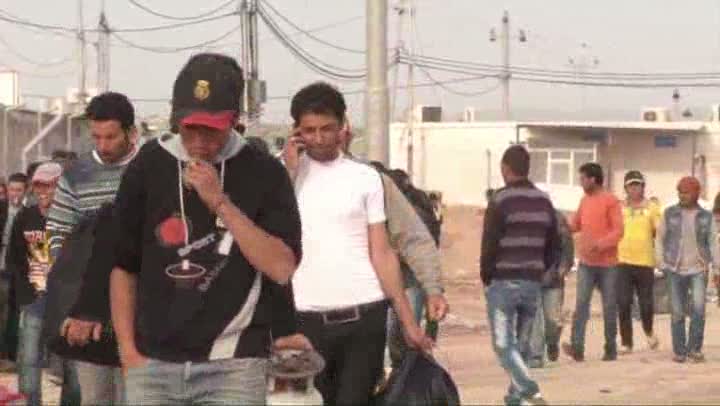

Iraq: A Home for a Syrian Family
Kava and his family arrive at Domiz camp in northern Iraq, traumatized by the conflict in Syria. With the help of UNHCR and its partners, his family has found shelter and a glimmer of hope.
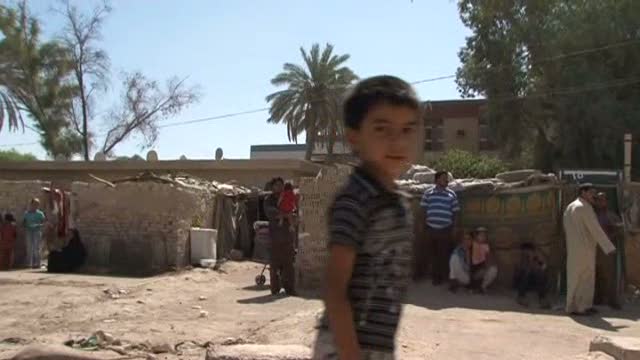

Angelina Jolie visits Baghdad
On her recent trip to the Middle East, UNHCR Special Envoy Angelina Jolie met internally displaced Iraqis and refugee returnees to Baghdad.
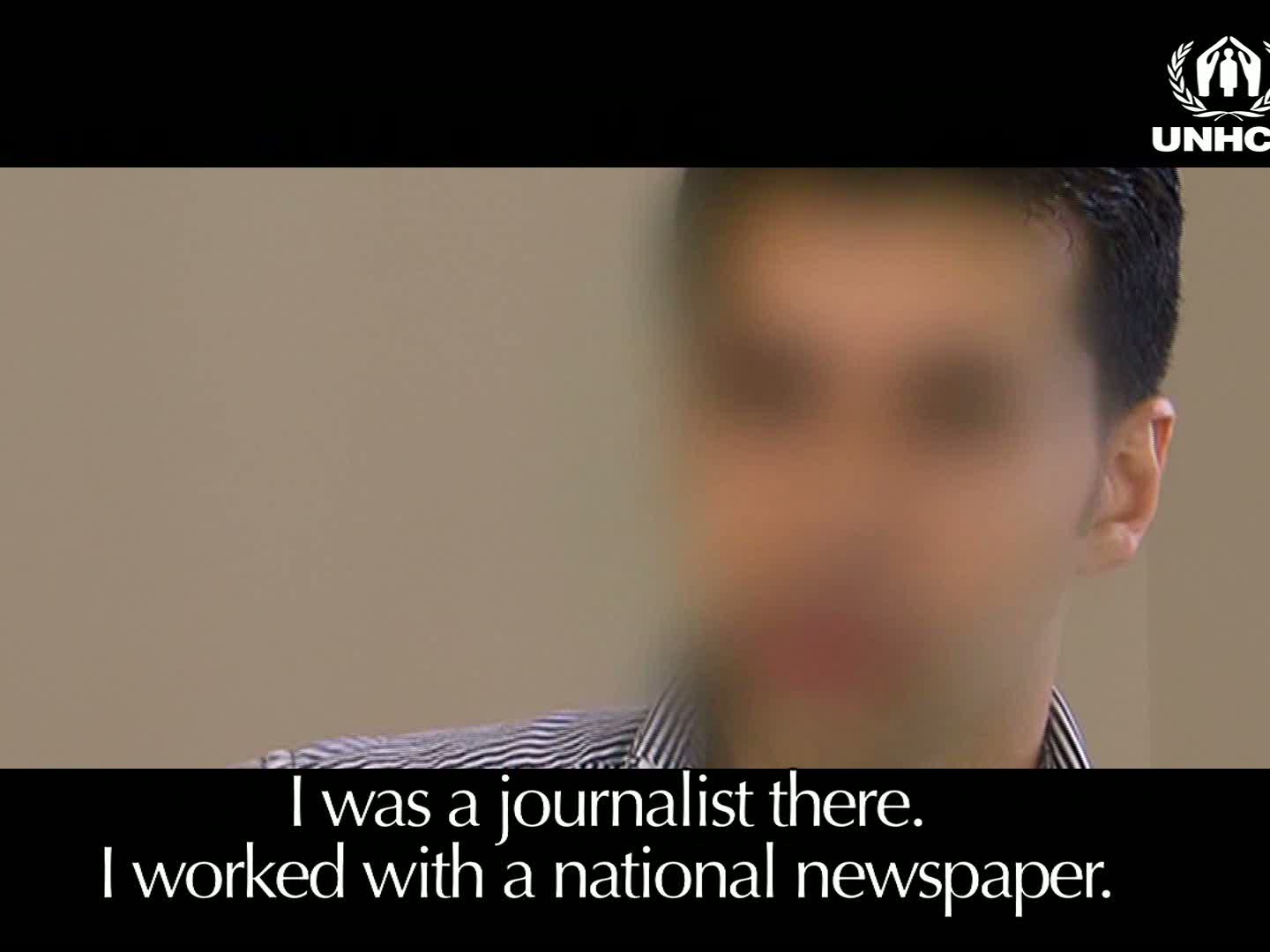

Romania: Saad's Dilemma
Saad, an Iraqi journalist covering politics, was targeted, kidnapped and held captive for three months. After escaping, he paid a smuggler to take him to Europe. We spoke with him in Romania, where he has begun building a new life.


Iraq: Harsh Living
There are more than 350 settlements for internally displaced people in Iraq.The living conditions in most of them are dire.
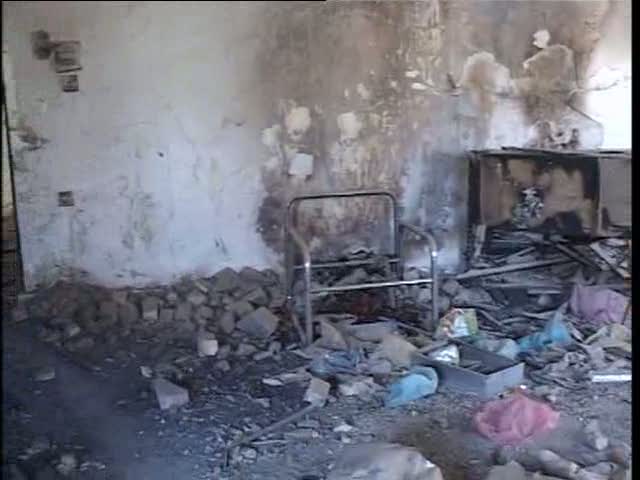

Iraq: Brick by Brick
In Iraq, where more than 2 million people remain displaced, UNHCR has launched a home renovation project to assist returns.
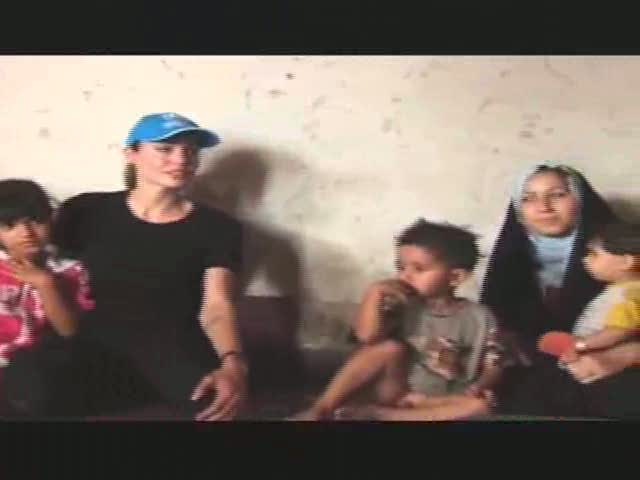

Angelina Jolie in Iraq
During a day-long visit to Baghdad, UNHCR Goodwill Ambassador Angelina Jolie visited a makeshift settlement for internally displaced people in the Chikook suburb of north-west Baghdad where she met with four families displaced from the district of Abu Ghraib and from the western suburbs of the Iraqi capital.
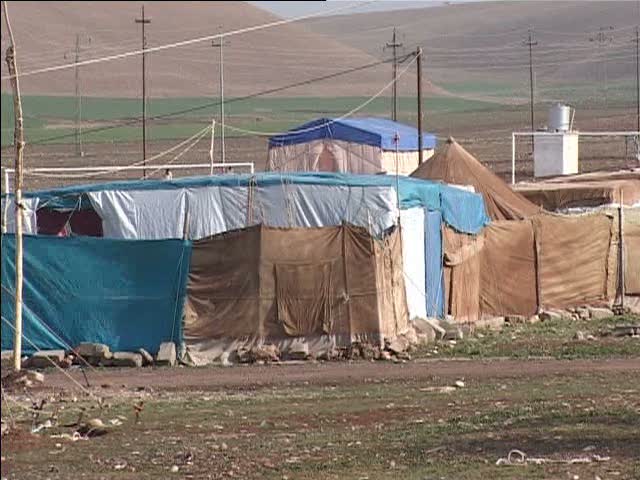

Iraq: On the Edge of Nowhere
Six years after the invasion to oust Saddam Hussein, Iraq is still insecure and about 1.8 million people live in limbo – without a job or a place to call home.


Life for Iraqi refugees increasingly desperate
More than 4.5 million Iraqis have been uprooted by the crisis in their country. More than 2.5 million of them are displaced within Iraq, while over 2 million have found refuge abroad, including 1.4 million in Syria and some half-a-million in Jordan. Life is getting increasingly desperate for these refugees as they run out of resources and, in some cases, overstay their visas.
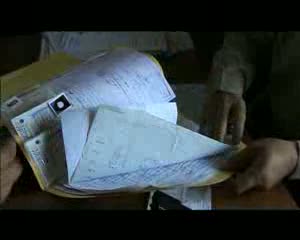

Surviving In Iraq
It's estimated that more than 2 million people are displaced in Iraq. The UN refugee agency is trying to help the most vulnerable get their papers in order.
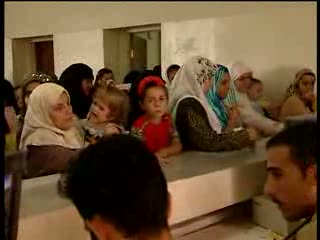

The Struggle To Go To School
It's one of the hardest choices Iraqi refugee families have to make - whether to send their children to school or to work. Even though Syria has opened its classrooms to Iraqi students, a growing number of refugee families simply cannot afford to send their children to school. UNHCR has launched projects to ensure that more Iraqi children access education, including remedial learning programs for those who have missed years of class. For the protection of those interviewed, names have been changed and faces masked.


Reaching Out To Iraqi Refugees
More than 1.5 million Iraqis are believed to have found refuge in neighbouring Syria. Many have exhausted their savings and are in an increasingly precarious position. UNHCR is trying to help them.
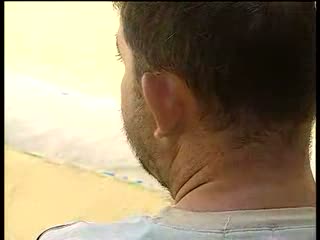

Testimonial: Iraqi Survivor
Testimonial by an Iraqi survivor
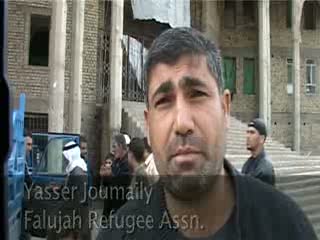

Falujah Iraq: Life In Limbo
Despite a decrease in violence in Iraq, millions of people remain displaced. This is the story of 50 displaced families living in a former hospital in the central Iraqi city of Fallujah.
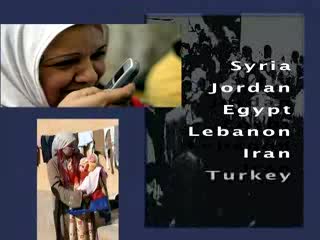

Iraq's Exodus Of Pain
The continued violence in Iraq is creating a humanitarian crisis of massive proportions. It is estimated that more than 2 million people have left the country and another 1.9 million are displaced inside Iraq. Each uprooted person has a personal and tragic story to tell. Help UNHCR celebrate World Refugee Day on June 20
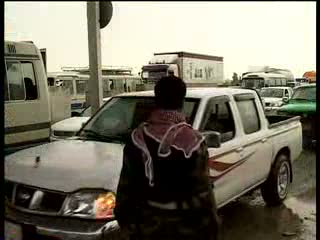

Displaced In Northern Iraq
There are an estimated 4.2 million uprooted people in Iraq - more than in any other country in the world. The flow of people to neighbouring states and individual governorates is becoming too great a burden. The northern region of Iraq has become the destination of choice for those who have little money, but entry is restricted.





